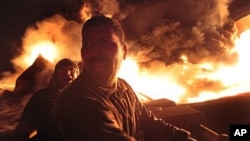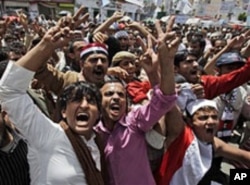Forces loyal to Libyan leader Moammar Gadhafi pounded oil tanks in the besieged city of Misrata Saturday, setting off gigantic fires that poured black smoke into the air.
Witnesses say pro-Gadhafi forces used helicopters and rockets to attack fuel storage tanks in the rebel-held port city, causing them to explode and burn. Rebel sources say the explosions have wiped out fuel reserves needed to withstand the lengthy siege of Misrata, which is the last city in western Libya under rebel control.
Libyan Deputy Foreign Minister Khaled Kaim told journalists Friday in the capital Tripoli that government forces would not stop trying to close Misrata’s port, accusing the rebels of using it to "bring arms to the city and evacuate some criminals."
Also in Tripoli, a tribal organization loyal to the government called for a general amnesty, but continued to call for the "liberation" of rebel-held territory. Rebel leaders, for their part, claimed that Colonel Gadhafi is "giving out money to encourage rebel fighters to change sides."
Pro-Gadhafi forces continued to shell areas along the Tunisian border. Witnesses say a number of shells fell inside Tunisia. Libyan government forces are besieging the towns of Zintan, Nalout and Yfran in the mostly Berber mountainous plateau near the border.
In the main rebel-held city of Benghazi, in eastern Libya, the head of the opposition Transitional National Council, Mustafa Abdel-Jalil, repeated his plea to Western and Arab states to help the rebels with modern weapons to help them combat pro-Gadhafi forces.
He says the rebels are capable of ground combat if they receive just a small amount of modern weapons, which would even the playing field. He stresses that weapons are the only major issue, since the allies are providing enough help from the air.
Meanwhile, the Arab daily Asharq Al-Awsat quoted a government source in Tripoli as saying that "matters appear to be moving towards the opening of a political dialogue to resolve the crisis." The paper said a rebel source in Benghazi confirmed the possibility of opening a dialogue. Rebel spokesmen, however, have long insisted that Colonel Gadhafi step down first.
Protests in Yemen
Elsewhere, protests continued for another day in towns and cities across Yemen, as the mostly young protesters kept up their demands for President Ali Abdullah Saleh to step down.
Opposition leader Saleh Mohsen told journalists that the street protests, rather than a stalled Gulf Cooperation Council plan, will ultimately bring about Saleh’s resignation.
He says that the revolution in the streets and squares, driven by the many people who have stood steadfastly night and day for three months, will ultimately bring about the fall of the regime.
Deputy Information Minister Abdou Jundy, an ally of Saleh, told Al Jazeera TV Saturday that the president still supports the GCC plan. He refused, however, to indicate if Saleh is ready to step down, which is the main condition of the plan.





